- Home
- Jack Kerouac
The Town and the City: A Novel Page 6
The Town and the City: A Novel Read online
Page 6
“Of course, George!”
“Then look at these collection envelopes. Of course I realize that the church is not self-supporting, it’s not in business, it needs the contributions of its parishioners and supporters, and all that. But haven’t you seen this sort of thing exploited, corrupted? Father Mulholland, in your sixty years as a priest you certainly must have seen it!”
“I have seen it.”
“Well, what about it?”
“Are there not priests who are the representatives of God, and are there not priests without whose business acumen, without whose tireless efforts, there would be no church? Of course you know that the higher the priest, the more he is a politician. You know that.”
“I didn’t know that exactly.”
“Someday, George, I’ll tell you the story of modern Christianity. It’s a long and complex story, involving much high politics.” Father Mulholland would purse his lips in pedagogic musing. “But now I want to ask you: if it is necessary that there be two worldly priests for the sake and the support of one genuine, devout, God-like priest, do you think the game is worth the candle? You remember the great Father Connors back in Lacoshua. Is it worth it?”
Martin would shake his head with wonderment. “Yes, by God, it’s worth it. Father Connors. Yes, yes. He was a priest. There’s only one priest I know who topped him. And that’s you, Father, and I mean it sincerely, believe me.”
“Come, come! Only a minute ago you were ranting and raving about my corrupt little collection envelopes.”
“No, that’s not fair. I was only saying for the sake of argument! I want to ask you something: here you have your parishioners going to church on Sunday morning, receiving Holy Communion, walking back to their seats with a mighty holy look. But while you’re sitting in your rectory on Saturday night, Father, I’ve seen them out on the streets and in the saloons, and there’s nothing holy about them then! Oh, it’s that look in church that beats me! I don’t know where they learned it! What about that, then, Father Mulholland. Don’t you admit that there’s just a little teeny bit of hypocrisy there!” And Martin would roar with laughter, poking the gangling old ecclesiast in the arm, and looking up eagerly in his face to see any signs of discomfiture there.
“George,” Father Mulholland would say, “George, I believe you fancy yourself a philosopher. I’m not going to answer your question. Indeed, I’m going to let you think about that question yourself.”
“I’ll think about it, Father, and what will be my conclusion?”
“Well, now,” the old father would say, carefully adjusting a battered old hat on the top of his head, looking down at Martin with a gleam of joy in his eyes, “supposing that come Sunday morning our friends whom you describe were still, as you say, bamboozling around, heh?”
“By that time, Father, they’re dead to the world. I know!”
“But not dead to God, evidently, because they all seem to turn up in church in the morning.”
“They do! But that’s only because their conscience bothers them!”
“My dear George,” the old priest would chuckle, gripping Martin’s arm and shaking him gently, almost deliriously, “you’re arguing with yourself, not with me. Now I’m going to leave you to your conscience and go away.” And he would gently clap Martin on the shoulder and gaze down upon him with his huge expressive visage of benevolence and old friendliness. He would leave with a cheerful backward wave of his hand and glide out of the shop, stooping in the doorway to pass. Martin would watch his departure with sorrow and wonder, because he was such an old man, because he was such a rare and marvelous person, and a priest.
There was something in Martin’s heart that never ceased its wondering and sorrow. There were days when everything he saw seemed etched in fading light, when he felt like an old man standing motionless in the middle of this light and looking around him with regret and joy at all the people and things in his world. Men saw him laugh and chew on cigars and talk excitedly and grow angry, but they never saw him in his lugubrious rueful solitudes when he choked with inexpressible sadness. He saw men cheat each other, he heard scorn every day, he saw bewilderment in the eyes of other men, he wandered through a harassed cycle of anger, guffaw, malice, hate, disgust, weariness. Then in a moment he embraced life and ran benevolently, joyfully, through it, only to resume suddenly a morbid, sometimes wicked, melancholy in which he was black with hatred and scoffing. But once by himself, in the antique light of his profoundest comprehension, he saw all these things, he stood apart from them, with infinite old regret, he wondered and lamented and cried out to himself, and repined in loneliness.
“This is it,” he would think. “This is the way life is. It’s such a strange thing—oh, it’s so funny, so short, God knows what it is.”
In moments like this, he gazed brooding at his children, and wondered what it was that weaved and weaved and always begat mysteries, and would never end.
He was also a lively man. In the Jockey Club he spread his form sheets out on the table before him, sipped from a cold foaming glass of beer, smacking his lips, lit a fresh cigar and plunged into his figures with absorbed gusto. At evening he came home and ate like three men. And later at night, as he was deeply involved in whether or not he should call the other man’s bluff or raise him a stake, he sat there puffing thoughtfully on a cigar, fidgeting his chips and grinning at the other man slyly.
All this was the likes of Martin’s days and nights.
[7]
One Spring gloomy young Francis Martin discovered that he was in love. He was seventeen years old, just finishing his last year of high school, and thinking mistily of going to college in the future.
Her name was Mary and she was an Irish beauty with black tumbling hair. One look from her and Francis was frozen in his soul. He knew that she would always hold him with those eyes of hers and laugh, somehow, because of it.
He had met her in school where, in an English class, she sat diagonally in front of him and cast her locks about on drowsy afternoons. He was the most brilliant student in the class and before long she was casting her locks about for him on those lovesick, heartsick afternoons which are nowhere sweeter than in high-school classrooms.
“Francis, read sonnet twenty-nine for us,” the proud old woman teacher would suggest dreamily. It was close to the end of the hour, time for poetry and lingering moods of “beauty and truth.” In the back of the class the boys drowsed sullenly. In the front part of the class stood tall spindly Francis, surrounded by the girls.
Francis reading in a precise, mature manner:
“When, in disgrace with Fortune and men’s eyes,
I all alone beweep my outcast state,
And trouble deaf heaven with my bootless cries,
And look upon myself, and curse my fate—”
“Francis! Deef heaven?”
“Yes, Miss Shaughnessy. I believe ‘deef’ is the Elizabethan pronunciation. And it makes for better poetry than def heaven.”
“Well, we’ll look that up,” the old woman smiled dreamily. “And, class, I want you to notice how Francis does his own thinking about poetry. You mustn’t only read, you must also read yourselves into it.”
The boys in the back of the room looked at each other with a bland indifference.
Francis continued:
“Yet in these thoughts myself almost despising—
Haply I think on thee—”
And here, turned up to him from around curling locks, were the dark bewitching eyes of his beloved Mary.…
In the lyrical Spring evening, then, he would start out for her house, borrowing his brother’s bicycle, and pedal slowly across the town in his stern and invincible manner. She lived in the southern part of Galloway, in an old ramshackle farmhouse on the banks of the Concord River there. And whenever he rounded the corner of the highway and came gliding on soft rubber tires towards her house, with its vines over the porch and its drooping trees, with the dark river beyond, and the aura of pastoral
simplicity all around, it never failed to cast a spell of fearful enchantment over him. At times he was hardly capable of controlling his wretched excitement, and more than once came wobbling to a stop at her fence post.
Her brothers, rawboned youthful farmers who called him Frank, were always sitting around in the soft evening darkness whittling and telling stories that were of no consequence to him.
“Hey, Frank!” they called.
“Here comes old Frank!”
“Frank” would thereupon go up on the porch, where Mary sat with her mother and a few kid sisters in creaking hammocks, and he would stand tensely against a post in the dark silhouette of the vines.
“My, Francis, you look to me like you’re getting thinner all the time,” the complaisant mother would say. This would please Francis considerably, it suggested that he ought to be fed and taken care of by someone like Mary.
In the same complaisant manner, Mary would survey him in smiling silence.
Later, when they were alone on the porch and the others were getting ready to go to bed, Francis would say: “Look at that moon. It never looks more beautiful than right here in South Galloway.”
“Oh, you and your poetry.”
“Well, what shall we talk about?”
“I don’t know, don’t ask me.”
Then Mary would brood so voluptuously, so sullenly, with a heavy-hanging rueful lip and dark impenetrable eyes.
“God, your eyes!”
“What about my eyes?”
“They’re so beautiful, honest.”
“You’re always saying that, Fran-cis. Look at them, look at them,” and with this Mary would open her eyes wide and comically stare at Francis, a little cruelly too. He loved her more than ever when she treated him like a fool.
He never wanted to kiss her because she was altogether too voluptuous—her lips were too yielding and rich when he pressed his own against them, his hand around her waist inadvertently probed too much soft shapely flesh. These were things about her that he never dared to dwell upon because he loved her as if she were an angel. Darkly, with a bitter melancholy, he wanted to spend the rest of his life watching her sulk and brood. This annoyed Mary.
“Kiss me, Francis. You’re an awful tease.”
And afterwards, as the night grew chilly, he would put his coat around her, and she’d sit wrapped in his arms staring off into the darkness. Her voice would get husky, a faint smile playing at the corners of her mouth, and while speaking she would look at him occasionally with those eyes. He continued to stare at her intently, in such a way as to insure her being bored with him and yet made curious by turns.
“Francis, you’re very smart, ain’t you? Someday you’re going to be a big success. What are you going to do?”
“I don’t know, but I know I’ll make a lot of money.”
“You’re a funny fellow. I wonder what it would be like to be married to you. What would you do?”
“What would I do?”
“Yeh. Do you know anything about women, about love?”
“Oh, I’m not interested in that, not now, I mean.”
“I know you’re not. You’re funny. That’s what I mean.”
“Mary,” he would say, “look at me.”
“Why?”
“I want to see your eyes.”
“Other fellows always want to neck. All you want to do is look at my eyes.”
“What other fellows?” Francis would inquire a little hotly.
“I had other fellows before I met you, what do you think?”
“Yes. Mary, if we were married, we’d—” But he could never go on and explain to her that he wanted to spend the rest of his life watching her, scrutinizing her moods, devouring the dark pouting sight of her.
“We’d what?”
“We’d be together, wouldn’t we?”
“Well, naturally.”
“What I mean is—”
“Oh, go home, Francis; you’re crazy. I’m not going to school tomorrow, I’m going to pretend I’m sick. Come and see me Thursday night.”
“Thursday! That’s almost a week!”
“I’ll write you a note tonight and have Jimmy give it to you in school. Go home now, I’m sleepy, I want to go to bed.”
“All right, Mary. What will you write in the note?”
“How should I know?—I haven’t written it yet!”
And Francis would leave sheepishly, turning to watch her enter the house in her lazy sorrowful way. All yawning and abstracted and tired of him and of everything. That was when he loved her the most.
He would pedal the bicycle homewards across the dark fields, always stopping near a cemetery to lean on the handlebar and consider the vision of his beloved Mary. From the top of a hill he could see her house down by the river, down by the silent slow-flowing Concord that Thoreau had known a hundred years ago, that Francis knew now with all the special enthrallment of morbid concentrated love. She was in the house now, she was moving about in her morose dissatisfied way, that light that was being dimmed was the light in her bedroom, she was in bed now and staring in the darkness with her fulsome pout. He pedaled homewards in dreamy meditation, pursuing Maryish thoughts to all their dark recesses.
In the morning he stalked the halls of the high school looking for the boy, Jimmy, who would bring him Mary’s note. It was thirty minutes too early; there was no Jimmy, there were hardly any other students, just an old janitor sweeping the halls. Now when the students began to arrive in laughing groups, there stood Francis by the main door searching every face. Jimmy lived next door to Mary, he had access to her miraculous presence when she wanted him to deliver notes, he saw her day after day moving about in her windows or out in the yard—he seemed to be more fortunate and favored than any other Jimmy in the world.
The boy finally arrived, holding out a note.
“Mary Gilhooley told me to give you this note, Francis.”
“A note?” Francis would inquire with raised eyebrow. “Oh, really? Let me see it.”
The moment the little freshman was out of sight, Francis would stalk away clutching the note in his pocket, and hurry down to his locker in great hungering strides; there, amid the shouts and clatter of the other boys, read the note in trembling secrecy, staring around him with a speechless astonishment as though a certain power in it were raising him, mad and seaweed-trailing, up above the surface of the common sea to unspeakable heavens.
Dear Francis,
Gee, I am so tired this morning I can hardly open my eyes. I can see Jimmy next door eating his breakfast so I guess he is almost ready to go to school so I better make this one short. Bessie is going to spend the day with me and we are going to listen to the radio. I’ll think of you every time they play something nice.
All my love, Mary.
During his morning’s classes Francis repeatedly took the note out of his pocket and examined the writing. He searched for hints in the very flick and shape of the letters, in the pressure of the pen on key words such as “dear” and in “you” and “love.” He seemed to find a special pressure upon the word “all” in “all my love.” None of the musical utterances of Shelley and Shakespeare could be so surrounded with lingering, rare, shadowy darknesses like this. He placed the open note atop a page of poetry—and he compared for hours between the lines.
Sick and drooping with love, he purchased a birthday gift for Mary in a Galloway jewelry store—a single string of fine smooth pearls—and placed them delicately in a red velvet box. On a soft May evening, he started out once again on the bicycle in all his severe and melancholy demeanor, and crossed the town thoughtfully, a moody inscrutable swain maddened by the witchery of his goal.
That night of her birthday, a night that he was never going to forget, he arrived at the old farmhouse and was greeted by her brothers.
“Hey, Frank! Old Frank! You looking for Mary?”
“She just went for a ride with Chuck Carruthers. You know old Chuck, the football player!”
“He came here in a Ford convertible.”
“And where did they go?” Francis asked feebly.
“They went that way.”
“She’ll be back, Frank. Sit down and make yourself comfortable.”
“No,” said Francis quietly. He looked down at her two brothers from his bicycle with an air of cold indifference. “By the way, when she gets back, give her this, will you?” And he handed them the box of pearls.
They called after him and yelled “old Frank” but he was speeding away down the road, away from her house, away from the town, towards the woods that stretched before him in flowery darkness.
He came to the railroad bridge and stared down at the waters. There were some children yelling on the river bank and splashing around in the water. He heard someone calling. “Fran-cis! Hey, Fran-cis!”—a distant, mysterious call.
And it was Mary. Down by the water’s edge he saw a Ford convertible coupe, and Mary herself waving at him and smiling. A tall well-built boy in a bathing suit stood beside her grinning as he wiped his hair with a towel.
Francis got off the bicycle and directed it down to the water’s edge over a path that ran through the bushes. He came slowly, sadly, while Mary was sauntering up to him with a casual and lazy petulance.
“I didn’t know you were coming tonight!” she was saying in her sullen way. “Why didn’t you call me?”
He stood motionless, staring at her out of the depths of a raging and futile loneliness. He could see her pouting lips, her dark smoldering eyes, her hair tumbled over one side of her face in the evening breeze.
“It’s your birthday,” he said listlessly. “I thought I’d surprise you.”

 Tristessa
Tristessa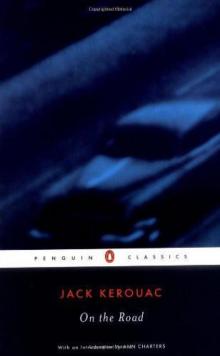 On the Road
On the Road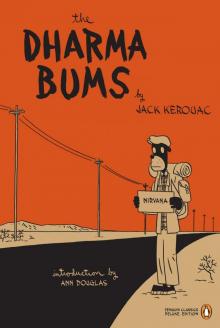 The Dharma Bums
The Dharma Bums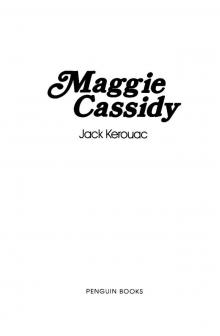 Maggie Cassidy
Maggie Cassidy Big Sur
Big Sur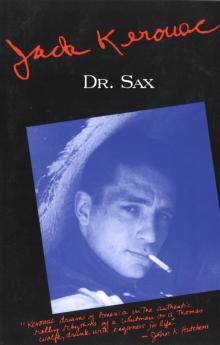 Dr. Sax
Dr. Sax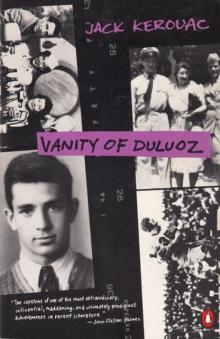 Vanity of Duluoz: An Adventurous Education, 1935-46
Vanity of Duluoz: An Adventurous Education, 1935-46 The Sea Is My Brother
The Sea Is My Brother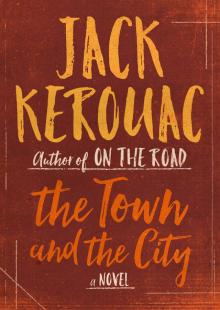 The Town and the City: A Novel
The Town and the City: A Novel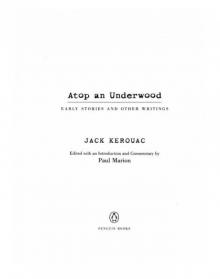 Atop an Underwood: Early Stories and Other Writings
Atop an Underwood: Early Stories and Other Writings Desolation Angels: A Novel
Desolation Angels: A Novel Book of Sketches
Book of Sketches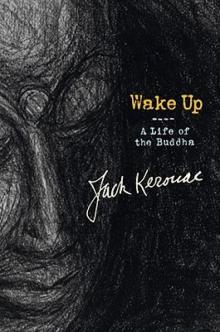 Wake Up: A Life of the Buddha
Wake Up: A Life of the Buddha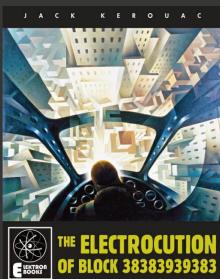 The Electrocution of Block 38383939383
The Electrocution of Block 38383939383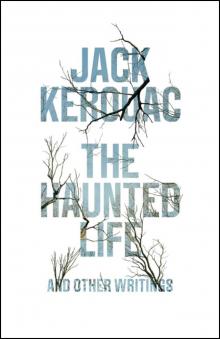 Haunted Life
Haunted Life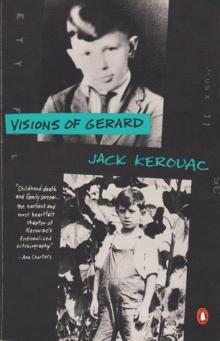 Visions of Gerard
Visions of Gerard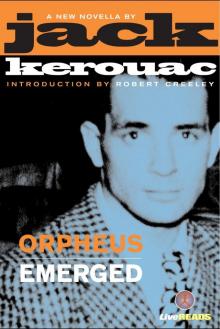 Orpheus Emerged
Orpheus Emerged Book of Blues
Book of Blues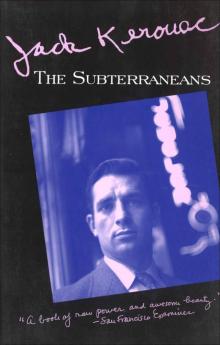 The Subterraneans
The Subterraneans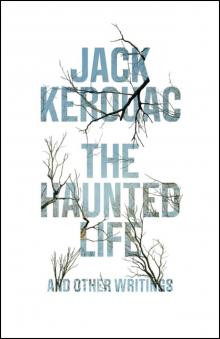 The Haunted Life
The Haunted Life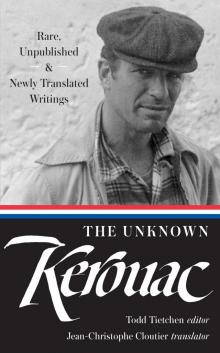 The Unknown Kerouac
The Unknown Kerouac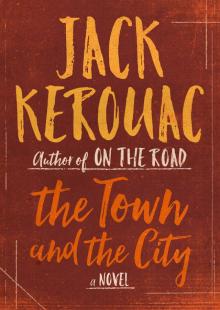 The Town and the City
The Town and the City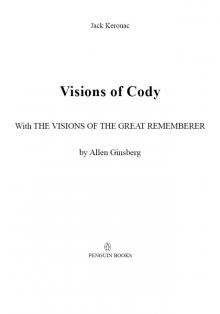 Visions of Cody
Visions of Cody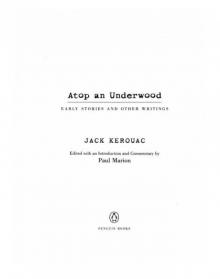 Atop an Underwood
Atop an Underwood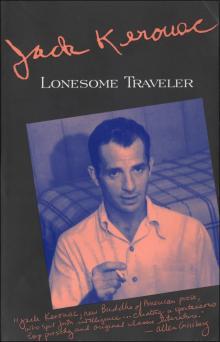 Lonesome Traveler
Lonesome Traveler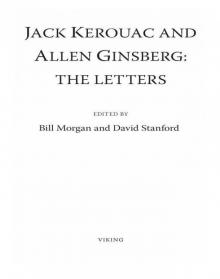 Jack Kerouac and Allen Ginsberg
Jack Kerouac and Allen Ginsberg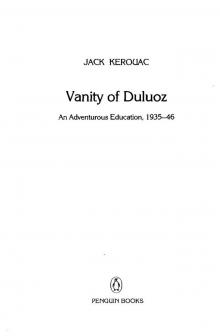 Vanity of Duluoz
Vanity of Duluoz Desolation Angels
Desolation Angels On the Road: The Original Scroll: (Penguin Classics Deluxe Edition)
On the Road: The Original Scroll: (Penguin Classics Deluxe Edition) The Sea Is My Brother: The Lost Novel
The Sea Is My Brother: The Lost Novel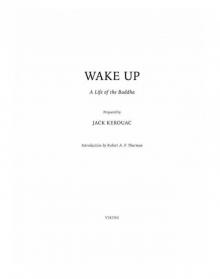 Wake Up
Wake Up The Poetry of Jack Kerouac
The Poetry of Jack Kerouac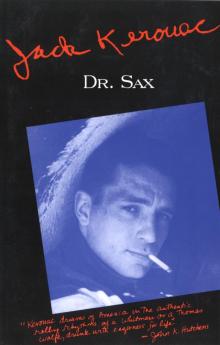 Doctor Sax
Doctor Sax